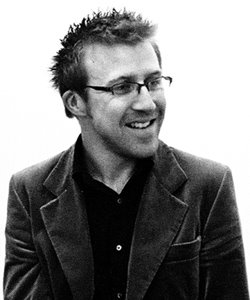The concept of this play is that Pinchbeck’s parents met in an amateur dramatic production of The Sound of Music, at the post show party. This ‘show’ is about the ‘post show party’ – hence the name. There are also clever other meanings you can get from the title, which I will leave you to consider quietly. Pinchbeck’s parents, along with the man himself, are the only performers; onstage throughout – Dad acting (more on this later) and Mum teching. The parents are lovely (or profoundly cruel people with the talent for appearing innocuous that is unique to the seasoned sociopath). The plot is simple – at the party, the post show party, the male actors, who have had little to do in the production, sing songs parodying the musical. Edelweiss becomes Idle Vice, for example. One of the men collapses mid-song, and eventually dies. The party called to a halt, Pa Pinchbeck takes the future Ma Pinchbeck home and they share an intimate kiss. Michael is pre-conceived.
The concept is an interesting one – the equivalent of a found poem. Much of the playwright’s job has been done for him. However, I’m not one of those people who complain about modern art or the BBC’s liberal Zionist bias etc, so that isn’t really a problem. Art is employment. And the elements of the story were employed quite well. The balletic repetition of the singer’s collapse, for example, and the rich connections between father and son which made for an onstage chemistry of a sort I’ve never seen before. Their moments of interchange were great. Pinchbeck’s father has the charisma of a theatrical knight tempered with an avuncular (ironic I know) humbleness. This actually works very well in combination with his son’s Dave Gorman levels of quiet smugness. I don’t know why I’m being cruel to Michael Pinchbeck – he has written a play about the Bodyline scandal, which is a fantastic thing to do. And he has produced an accomplished piece of event theatre. But I feel no guilt, for some reason.
Perhaps it is because the ideas, chiefly that Garden of Forking Paths, Sound of Thunder (and, if you must, Butterfly Effect) conceit of the present’s shaky contingency on the past, are not taken to any particularly new conclusions. It is personal, but nowhere near enough to be called confessional (not that this is a criticism really; experimental theatre has too many Plaths and not enough ovens). It is a charming curio with aspirations. Noble enough, but ultimately unremarkable. That said, it is worth seeing for the palpable family pride at the curtain call.
Cambridge Tab ****

No comments:
Post a Comment